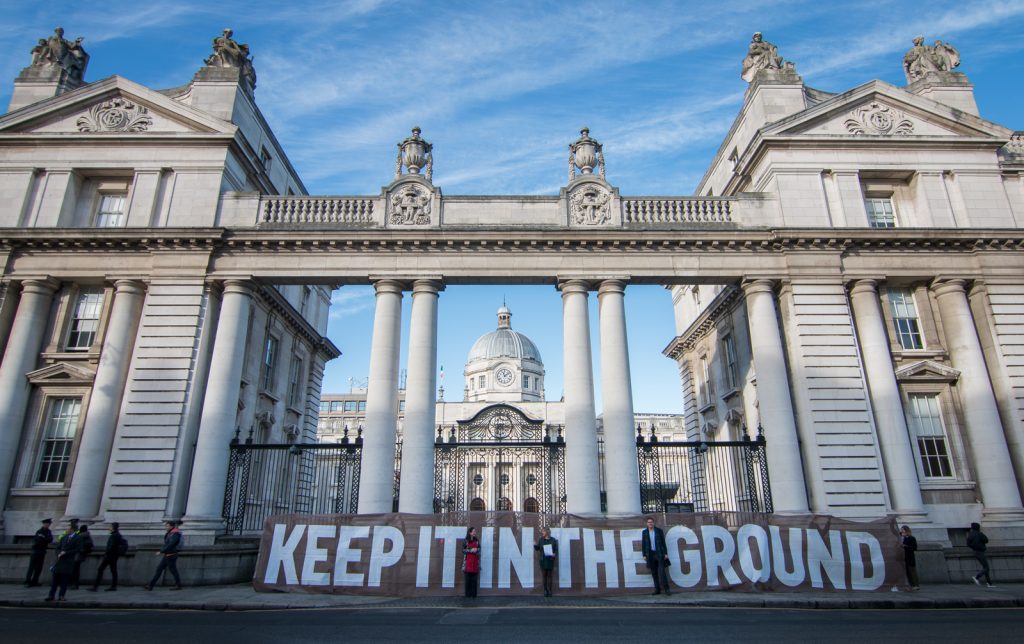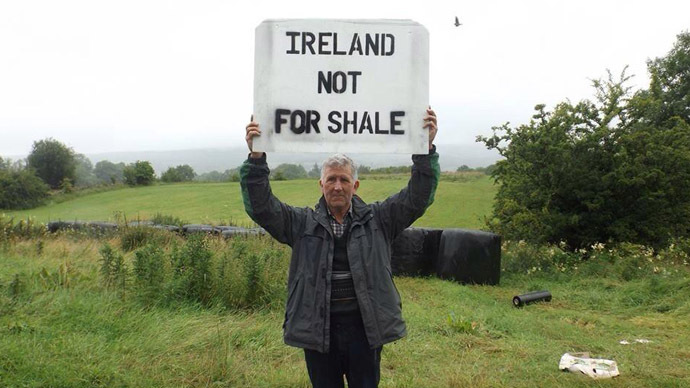‘Morally reprehensible’ to seek special treatment for controversial gas project

October 2nd, 2019
It is “morally reprehensible” for the Government to support a gas terminal project that could facilitate the importation of fracked gas from the US, critics have warned.
Speaking at a briefing today on the Government’s plan to back the Shannon LNG project for special EU support, Kate Ruddock of Friends of the Earth said that the move would run counter to the advice of climate experts to keep the majority of known fossil fuel reserves in the ground.
The Shannon LNG project would see a gas terminal built near Ballylongford in Co Kerry – and close to a protected coastal wetland on the Shannon Estuary – to import liquefied natural gas (LNG) from the US.
According to project owners New Fortress Energy, the terminal will have the capacity to import and regasify more than six million gallons of LNG per day, the equivalent of our current annual gas imports.
In a recent filing to the Securities and Exchange Commission (SEC), the company said that it receives a portion of its gas supply from hydraulic fracturing, otherwise known as fracking.
Fracking is a process for extracting natural gas by drilling into rocks and injecting pressurised water, sand and various chemicals to force out the gas.

‘Morally reprehensible’ support
Ms Ruddock said that any move to support the building of infrastructure to import fracked gas into Ireland is “morally reprehensible”, especially as we banned fracking here two years ago.
The ban followed a comprehensive study from the Environmental Protection Agency that found that the practice has the potential to damage both the environment and human health.
Numerous academic studies in the US have linked low birth weights, preterm births, birth defects, asthma, and neurological development issues with fracking, particularly among populations living near wells and fracking facilities.
The Shannon LNG terminal is currently included in the third round of the European Commission’s Project of Common Interest (PCI) list through which it could gain access to a €5.35 billion funding pot.
Inclusion on the list would also allow it to go through a fast-track planning and permit granting process, essentially overriding environmental and climate protections.
PCIs are cross-border energy infrastructure projects that the EU says will help the bloc to achieve long-term decarbonisation in line with the Paris Agreement targets. Shannon LNG was put forward as part of a north-south gas interconnector scheme running from Scotland down to Malta.
The lists are redrawn every two years and the Government must now give its approval for the terminal’s inclusion in the next round or it will be removed from the list. It is believed that representatives from the Department of Climate Action (DCCAE) will be in Brussels this Friday where the next PCI list will be adopted.

An undemocratic process
Ms Ruddock said that the State’s support for the project is clearly undemocratic as there has been no strategic environmental assessment carried out or parliamentary scrutiny of the decision that could see Ireland become a net exporter of fracked gas to Europe.
“This is another undemocratic move by the Government to prevent debate on a key climate action issue. To schedule hearings one week after the decisions have already been made makes a mockery of our parliament,” Ms Ruddock said, referencing next Wednesday’s meeting of the Joint Committee on Climate Action where the issue of fracking will be discussed.
Deputy Brid Smith of People Before Profit, who organised the briefing, accused the Government of keeping the date of the Commission meeting secret, a move she said is “disgraceful and disingenuous in the extreme”.
“Yet again this Government’s hypocrisy and cynicism on climate change is exposed- despite all the rhetoric the reality is utter disregard for the impacts of their policy,” added Ms Smith, whose recent Bill to ban new oil and gas exploration license was stymied by Government opposition.
“Continued support for fracked imports, especially given their methane emissions and their impacts on communities across the US, renders all their rhetoric on climate action meaningless,” she added.
DCCAE did not respond to requests from The Green News to confirm details of Friday’s meeting in Brussels or to outline its position on the Shannon LNG project.
Locking US communities into dirty future
Also speaking at the event, Julia Walsh, an anti-fracking activist in the US, said that she was “very shocked” that the Government kept the date secret. This, she said, shows the extent to which the “the fossil fuel industry really has its foot in the door here in Ireland”.
Ms Walsh, whose organisation Frack Action was pivotal in getting fracking banned in the state of New York, said that approval of the terminal for special European status will have major consequences for NGOs and communities fighting for a US fracking ban.
“I plead to the Irish people and particularly the Taoiseach to take [Shannon LNG] off the list and to open a public consultation process to examine the potential impact on importing fracked gas into Ireland.
“We are asking the Taoiseach and the Irish Government not to import US fracked gas which will lock us into fracking and its impacts to public health and the climate,” she said, referencing the impact on communities she has worked alongside in Pennsylvania.
She said that there is a range of impacts across the State, including health and environmental issues linked to air and water pollution, as well as spikes in drug abuse, violence and sexual assault linked to the seasonal influx of a male-dominated workforce for the industry. The workers, in turn, face dangerous working conditions at many sites, she added.
A recent investigative series in the Pittsburgh Post-Gazette examined the potential links between shale gas drilling and fracking and a rise in cancer cases among children in counties where the industry has a stronghold.
Ms Walsh warned that the gas arriving at the Shannon LNG terminal would most likely come from the “fracking fields” of Pennsylvania based on plans outlined by New Fortress Energy.
In SEC filings earlier this year, the company said that it plans to develop liquefaction assets in areas with “significant ‘stranded’ reserves” not connected to large interstate or transnational pipelines “as is the case in Pennsylvania”.
The company is currently developing one liquefaction facility in the Marcellus area of Pennsylvania scheduled for completion in the first quarter of 2021. The facility would have the capacity to produce between three and four million gallons of LNG per day.
[x_author title=”About the Author”]







